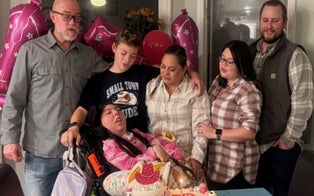During her 18th week of pregnancy, Jocelyn Rodriguez and her husband learned their daughter has spina bifida, a birth defect that occurs when the spinal cord fails to close normally during development.
Jocelyn Rodriguez hasn’t given birth yet, but she already knows what it will be like to hold her daughter, thanks to new 3D printing technology.
“Oh my gosh, is this happening?" Jocelyn said about the experience. “It was pretty crazy.”
During her 18th week of pregnancy, she and her husband learned their unborn daughter has spina bifida, a birth defect that occurs when the spinal cord fails to close normally during development.
They were referred to Orlando Health, where surgeons use a new delicate procedure to correct birth defects before a baby is even born. By using MRI and ultrasound imaging, they can print a replica of a fetus. This allows surgeons to see details like skeletal structure and fluid sacs in the brain caused by spina bifida.
Dr. Samer Elbabaa, pediatric neurosurgeon at Orlando Health, explains how this is done. “Models prior to surgery not only mimics the anatomy of the defect or the spinal defect, but also educates the surgeon about potential challenges, or intraoperative complications.”
As doctors performed the surgery, Jocelyn was full of emotions. “A lot of emotions kind of went through my head. I wanted to do everything I could possibly to give her a life that wouldn't be as difficult with disabilities. And they said this is her best shot at living a semi-normal life."
Now, a C-section has been scheduled so Jocelyn can deliver. She and her husband plan to name the baby Kandace. “I'm ready to take care of her,” she said. “Ready to see her prove herself because I know she's going to.”
The first-time mom says her experience shows there are so many possibilities. And other moms who may get a similar diagnosis should never lose hope.





